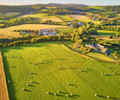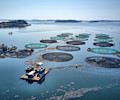Investor network welcomes first steps towards a roadmap from UN Food and Agriculture Organization, long called for by a FAIRR-backed statement supported by $18 trillion investors
FAIRR broadly welcomes this first iteration of the roadmap, with the full report expected to follow in the coming days
It is welcome to see references to shifting agricultural subsidies and ten targets that are measurable and timebound, covering the issues of crops, soil, and forests among others
FAIRR members representing $7 trillion have called for the reform of harmful agricultural subsidies by 2030
“We will look back at COP28 as the turning point for a seismic shift in agri-food policy and investment in the decade ahead.” said Jeremy Coller, Chair and Founder of FAIRR
(Dubai, 10/12/23). As COP28 draws towards its conclusion, the UN Food and Agriculture Organization (FAO) has launched the first outline of its highly anticipated roadmap to align agri-food systems with 1.5°C and the second Sustainable Development Goal to end hunger, with the full report expected to follow in the coming days.
The roadmap was created following a statement signed by investors representing $18 trillion and coordinated by the FAIRR Initiative, which urged the FAO to produce a roadmap for a resilient sector that can deliver global food security while striving to mitigate climate change and biodiversity loss.
The initial report released by the FAO today outlines ten targets that are measurable and timebound, covering the issues of crops, soil, and forests among others. However, full details behind these targets and whether they align with the 1.5 trajectory can only be meaningfully assessed once the full report is published – expected in the coming days.
FAIRR, a collaborative network of investors representing over $70 trillion in assets and focused on ESG risks and opportunities in the global food system, welcomes this initial report as the first step towards an effective roadmap that investors can use to align their portfolios with a climate-smart, nature-positive and just transition.
It is encouraging to see targets for methane reduction and discussion on shifting agricultural subsidies to support healthy diets, however, the current language does not go far enough towards alignment of nature and biodiversity goals as set out in the Global Biodiversity Framework. Nor does it offer suitable ambition on deforestation – targeting the elimination of gross deforestation by 2035, rather than 2025 as suggested by the Science-Based Targets initiative.
As we await the full report, FAIRR reiterates that within the global food supply chain the livestock sector is the largest driver of global greenhouse gas emissions, deforestation, biodiversity loss, and antibiotic resistance. So any vision for the sector must address head-on the question of how to put protein on our plates without undermining the health of humans and the planet.
Jeremy Coller, Chair and founder of FAIRR said:
“Climate science is clear that we must urgently transition the food sector to a future where the job of putting food on our plates doesn’t cost the Earth. For nearly two years, FAIRR’s investor members have called for the UN FAO to lead the transition by setting out milestones in a roadmap for the food and agriculture sector. A roadmap is critical to set out a framework and clear milestones to help markets understand what a net zero food sector looks like. As we saw with the energy sector a roadmap can send a clear signal, helping ensure policy and capital are in sync.
“The summary report issued this weekend is just the start of this important conversation. Investors and other stakeholders will welcome the focus on methane reduction and realignment of subsidies to support farmers’ transition but will want more detail on areas such as deforestation, healthy diets and antibiotic risk. However, the signal from policymakers is clear.
“With more than 150 countries now signed up to the Emirates Declaration to account for agriculture in their Nationally Determined Contributions (NDCs), a robust UN FAO roadmap could provide a pathway for countries, companies and investors to transition the sector.
We will look back at COP28 as the turning point for a seismic shift in agri-food policy and investment in the decade ahead. COP28 started with the Emirates Declaration which commits more than 150 countries to include food and agriculture in their Nationally Determined Contributions (NDCs), but it is critically important that this COP ends with food and agriculture being accounted for in the Global Stocktake (GST).”
Sofía Condés, Head of Investor Outreach, FAIRR said:
“The FAO’s roadmap, alongside the Emirates Food Declaration, will set the parameters for a decade of transition for the global food sector. Policymakers in Dubai have sent a clear signal to the markets that the agri-food sector will be tightly bound into the next round of Nationally Determined Contributions in 2025. It signals that investments in sustainable food innovations, such as alternative protein, regenerative agriculture and deforestation-free supply chains must play a bigger role in ensuring global nutrition security while meeting climate and nature goals.
“However, as this roadmap continues to evolve, we encourage the FAO to align more closely with other frameworks already used by the private sector, such as the Science Based Targets Initiative, and we hope for further iterations to provide more granular implementation details that are a priority for investors to plan and support this transition.”
Alexander Burr, ESG Policy Lead, Legal & General Investment Management said:
“Agriculture alone is identified as the threat to 24,000 of the 28,000 (86%) species at risk of extinction, and land degradation has been estimated to cost between $6.3 and $10.6 trillion annually. We therefore strongly welcome the release of the first phase of the Global Roadmap for Agriculture and Land Use. It is a complex sector that is both at high risk from nature loss and climate change, whilst also being a critical sector to transition if we are to achieve our international commitments set out in the Global Biodiversity Framework and Paris Agreement, and also the long-term strength of our health systems. This independent and robust global roadmap, combined with guidance from initiatives such as the Science Based Targets Initiative, enables investors to hold companies and policymakers to account and accelerate the transition.
Notes to editor
Media contact
For more information, including interviews and comment, please contact:
Mike Marshall, ESG Communications
t: + 44 (0)7728 816 426 | e: mikem@esgcomms.com
About FAIRR
The FAIRR Initiative is a collaborative investor network, founded by Jeremy Coller, with a membership of $70 trillion in collective assets of support. FAIRR works with institutional investors to define the material ESG issues linked to intensive livestock and fish farming systems and provide them with the tools necessary to integrate this information into their asset stewardship and investment decisions. This includes the Coller FAIRR Protein Producer Index, the world’s first comprehensive assessment of the largest global animal protein companies on environmental, social and governance issues. Visit www.fairr.org and follow @FAIRRInitiative.











